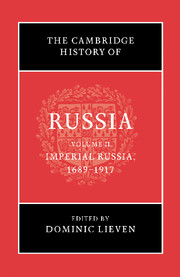Book contents
- Frontmatter
- Introduction
- Part I Empire
- Part II Culture, Ideas, Identities
- Part III Non-Russian Nationalities
- Part IV Russian Society, Law and Economy
- Part V Government
- Part VI Foreign Policy and the Armed Forces
- 23 Peter the Great and the Northern War
- 24 Russian foreign policy, 1725–1815
- 25 The imperial army
- 26 Russian foreign policy: 1815–1917
- 27 The navy in 1900: imperialism, technology and class war
- Part VII Reform, War and Revolution
- Bibliography
- Index
- Map 5. The Russian Empire (1913). From Archie Brown, Michael Kaser, and G. S. Smith (eds.) Cambridge Encyclopedia of Russia 1982.">
- Plate Section">
- References
23 - Peter the Great and the Northern War
from Part VI - Foreign Policy and the Armed Forces
Published online by Cambridge University Press: 28 March 2008
- Frontmatter
- Introduction
- Part I Empire
- Part II Culture, Ideas, Identities
- Part III Non-Russian Nationalities
- Part IV Russian Society, Law and Economy
- Part V Government
- Part VI Foreign Policy and the Armed Forces
- 23 Peter the Great and the Northern War
- 24 Russian foreign policy, 1725–1815
- 25 The imperial army
- 26 Russian foreign policy: 1815–1917
- 27 The navy in 1900: imperialism, technology and class war
- Part VII Reform, War and Revolution
- Bibliography
- Index
- Map 5. The Russian Empire (1913). From Archie Brown, Michael Kaser, and G. S. Smith (eds.) Cambridge Encyclopedia of Russia 1982.">
- Plate Section">
- References
Summary
From the end of the fifteenth century to Peter’s time the main preoccupation of Russian foreign policy was the competition with Poland-Lithuania for territory and power on the East European plain. Poland was the hegemonic East European power for almost two centuries, and after initial success by 1514, Russia struggled in vain against its neighbour with few intervals of peace or goodwill. The long series of wars that resulted culminated in the war of 1653–67, which brought the Ukrainian Hetmanate into the Russian state and marked a decisive turn in Russia’s favour. Relations with the Tatar khanates to the south and east were more complex. Russia had conquered Kazan and Astrakhan in 1552–6 but was unwilling to confront Crimea, whose overlord was the Ottoman Empire, western Eurasia’s greatest power until the very end of the seventeenth century. The tsars preferred to build elaborate defences in the south, a line of forts and obstructions that stretched hundreds of miles from the Polish border to the Volga, and mobilise the army every spring rather than risk war with the Ottomans by pressing too hard on Crimea. The only area of relative security was the north-west, the Swedish border. The expansion of Sweden into Estonia in the 1570s and the capture of Ingria, ratified at Stolbovo in 1619, cut Russia off from the Baltic and placed an ever more powerful neighbour on Russia’s frontier, but Sweden’s main preoccupations were with Denmark, Germany and Poland, not Russia. In the seventeenth century Russia’s relations with Sweden were good (apart from the war of 1656–8, a result of the Polish tangle) and the King of Sweden was the only European monarch to be allowed to send a resident emissary to Moscow, from 1630 until the outbreak of the Northern War.
Keywords
- Type
- Chapter
- Information
- The Cambridge History of Russia , pp. 487 - 503Publisher: Cambridge University PressPrint publication year: 2006
References
- 2
- Cited by



